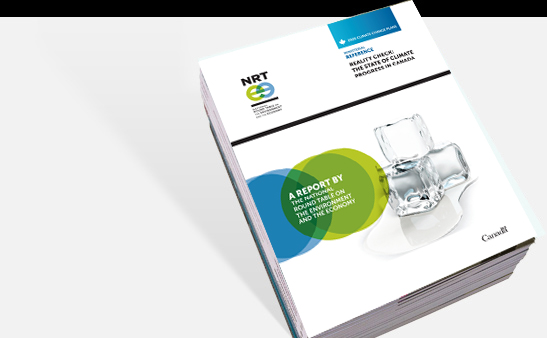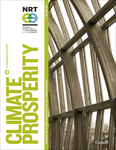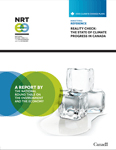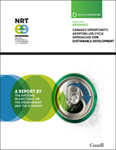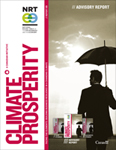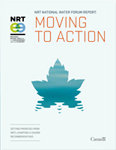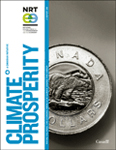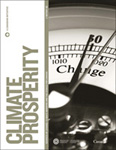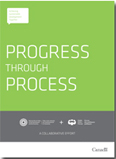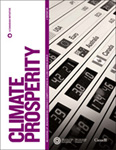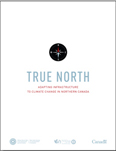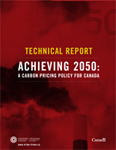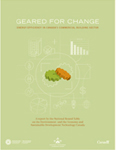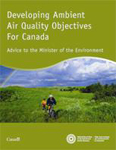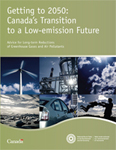Policy Pathway Report for Climate Impacts and Adaptation – Research
Consistent with our national mandate, our aim is to produce a report with wide applicability to Canadian industry. We need to make a business case for company investment in adaptation, while seizing the commercial opportunities emerging with a changing climate. Interpreting climate forecasts, climate change impacts information, and using decision support tools to assess and quantify risk and opportunity will all be crucial from business to adapt and prosper.

The NRT is currently developing a policy advisory report exploring ways to build capacity and enhance action to adapt to climate change among Canadian industry. The NRT believes that Canada’s economic prosperity in a changing climate in part depends on the capacity and action of businesses to successfully manage climate change risks and opportunities. However, climate change risks (and opportunities) have yet to become meaningfully and systematically integrated into corporate planning, practices and investments in Canada.
Our report will help draw connections between resilience in a changing climate and core business strategies and priorities. It will also provide advice for businesses to navigate climate change risks and seize opportunities, and advice to Canadian governments on how best to support industry engagement and action on the issue.
Research questions
- Overarching questions: What do Canadian businesses need to do to prepare and take action to manage the risks and opportunities of a changing climate? How can and should Canadian governments support business capacity and action, on a priority basis?
- How are Canadian businesses exposed to climate change risks and opportunities and how are they adapting?
- What factors are enabling business action to adapt? What is holding businesses back?
- What can we learn from the successes and failures of early adapters?
- How can governments, alone and in collaboration with others, help shift business practices today and support the long‐term resilience of Canadian businesses in a changing climate?
Work plan
The NRT will be relying on a combination of research and convening events to explore the questions set out above. Consistent with our national mandate, our aim is to produce a report of wide applicability to Canadian industry. But, in order to be useful and meet our timelines we have to quickly, and, perhaps, iteratively, identify pinch‐points and conditions for success that are common across industry sectors. The following themes have come up in discussions with stakeholders as useful to more than one industry sector. Our intention is to weave these themes in our research and convening.
- Communicating the issue so it gets on the corporate agenda
- Interpreting climate forecasts, climate change impacts information, and using decision support tools to assess and quantify risk and opportunity
- Making a business case for company investment in adaptation: economic rationale, timing of action, dealing with climate uncertainty
- Seizing commercial opportunities from the changing climate
- Embedding climate change risk and opportunity management into the corporate DNA
- Collaborating with companies across the supply chain to increase overall economic performance
- Monitoring changes in the climate risk profile to promote timely action on material risks
- Empowering small companies to prepare for climate change risks and seize opportunities
Program Update
Over the past year, the NRT has undertaken research and convened stakeholders to explore the exposure and preparedness of Canadian businesses to the risks and opportunities of a changing climate. Building from the climate adaptation experiences of thirteen pacesetting firms, we have compiled a roadmap for business success in a changing climate comprised of three phases:
Phase 1: Raise awareness
Because the range of climate and physical effects — and in turn the range of possible business impacts — is broad, firms must first understand the consequences of both increasingly severe weather and gradual changes in climatic conditions for their organization. A Hydro-Québec’s case study shows how they identified areas of activity particularly sensitive to a changing climate through consultation with staff from various divisions as a key first step.
Phase 2: Assess and manage risks and opportunities
To prioritize actions, firms must assess specific risks and opportunities, identify options for managing them, and decide how to implement responses. A Whistler Blackcomb case study shows how they took stock of future snow conditions in developing their climate change strategy to diversify its offerings to enhance off-peak revenues, invest in additional grooming, snowmaking and snowfencing, and build resilience into infrastructure at the planning stage.
Phase 3: Build climate resilience across the enterprise
A further phase is then to embed climate resilience from the boardroom to the copy room. The RBC case study shows how they have thorough risk management and investment due diligence processes in place, adding new risk dimensions to its credit review process and identifying key sectors most likely to be affected by the impacts of climate change.
These lessons and more will appear in three reports to be released this spring. First, we will release our case studies report, intended for adaptation practitioners, documenting successful strategies and tactics of thirteen companies to build business resilience in a changing climate. These companies are: Cameco Corporation, Royal Bank of Canada, Hydro-Québec, Tolko, EBA Engineering, JD Irving, Summerhill Pyramid Winery, Rio Tinto Alcan, Coca-Cola, Whistler-Blackcomb, Entergy, Munich Re, and BC Hydro. Second, a policy advisory report will provide information on why the issue matters for public policy and advice to businesses and governments on what each group can and should do to enhance private-sector action to manage the risks and opportunities of a changing climate. Third, we will release a dynamic business-focused report with a “how-to” also recommending priority actions for business.




